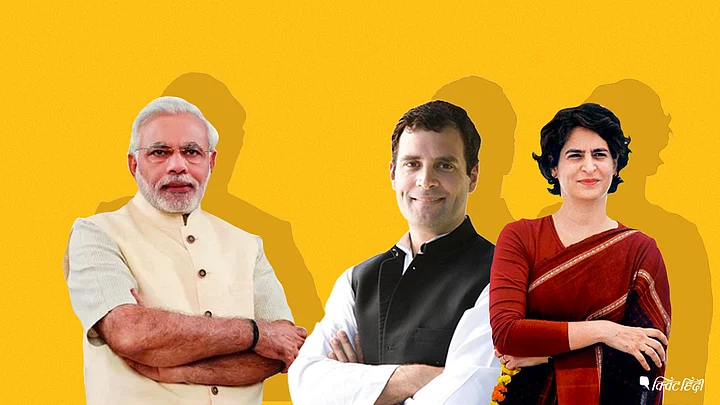When Prime Minister Narendra Modi was speaking in the Lok Sabha on Thursday, 7 February, fiercely tearing into the Congress, the Opposition defence – a group of Congress leaders at 24, Akbar Road – were whispering ruefully.
Had Priyanka Gandhi Vadra been in Parliament, the Congress response would have been far more effective and sharper than Mallikarjuna Kharge’s bid to find holes in Modi’s regime.
As if Modi needed to prove anything, the Congress and the entire non-NDA political formations were reminded again that Modi alone has the capacity and capability to get another term in office.
The fag end of 2018 may have seen the Congress wresting Madhya Pradesh, Rajasthan and Chhattisgarh, but the Grand Old Party is not too confident of crossing the 100 Lok Sabha seat mark in May 2019.
The only silver lining is that the general elections are fought across 543 parliamentary seats, spread over 29 states, where voters may not be influenced by Modi’s oratory skills inside Parliament.
After all, farm distress is a reality. The budgetary grant of Rs 500 a month for farmers is a tacit understanding that all is not well in the agrarian sector. The disquiet over jobs is far too visible, even as the chief statistician resigned and many crucial figures ranging from crimes to key economic indicators are missing.
‘Mahamilavat’
Modi’s bid to club various acts of corruption – from Robert Vadra, to Vijay Mallya, to Christian Michel to the Saradha scam – is compelling. It is aimed at building a narrative that corruption is acting as the glue to bring a combined Opposition under a big tent – mahamilavat is what he described it as, while taking a pot-shot at the Mahagathbandhan.
But this calls for a reality check. Electoral verdicts in India have been volatile. People of Tamil Nadu have had little or no qualms about electing J Jayalalitha or M Karunanidhi. Similar cases have been seen in Bihar, Uttar Pradesh, Himachal Pradesh, Haryana, Jharkhand and many seats in the Northeast.
Corruption in high places is indeed a curse, a scourge. But tardy legal trial, selective application of law and the NDA government’s move to gather pace in the Vadra, Mayawati, Malaya, Michel, and Saradha scam cases closer to the 2019 general elections makes corruption a political tool.
Surely, if the Modi regime (Sambit Patra included) had specific details of Vadra’s wrongdoings, the Centre and BJP-ruled state governments of Rajasthan and Haryana had months and years to act against him.
The timing of these cases gives non-bhakt voters pause.
The prime minister may be within his rights to take on the Congress on Rafale and other matters of national security. But a thought occurs: If the Congress is indeed playing havoc with sensitive matters of national security, what has prevented the prime minister from acting against it?
Remarks like “Congress doesn’t want Indian Air Force to be strengthened... I am putting a serious charge” require proof and substance. Old timers may not forget easily how Congress prime minister Indira Gandhi was solely responsible for dealing a body blow to Pakistan in 1971, splitting the country into two.
One may recall Modi’s speech at Guna, Madhya Pradesh as part of the run-up to the 2014 general elections, where he had promised to fix the Congress. “Hum unki neend chura lenge (We will steal their sleep),” Modi had said.
Nothing has happened till now, when another cycle of parliamentary polls are around the corner.
It is understandable to argue that there is no credible evidence to show EVMs can be hacked remotely. EVMs have brought in immense cost savings. With the VVPAT now becoming common, a paper trail is being created for future reference and a method for detection of post-poll fraud is now available.
But clearly, any election process has to satisfy three very important criteria: (1) Anonymity/secrecy; (2) Transparency; and (3) The ability to verify. In some ways, the EVMs fail on all three counts.
Purely in terms of optics – from the point of view of a dispassionate observer who heard Modi’s speech with a 'sakshi bhav’ – one wonders why the prime minister, Union ministers and BJP spokespersons are invariably so angry while speaking.
This manifestation of anger does not augur well for those in power. It tells a story of hidden disappointment and frustration.
Modi’s bid to recapture the spirit of 2014 in his final speech in the 16th Lok Sabha may cheer party sympathisers but may not prompt either 31 percent of voters or a newer lot to shout “Narendra Modi dobara (again).”
(Rasheed Kidwai is author of ‘24, Akbar Road, Ballot’ and ‘Sonia: a Biography’. He is a Visiting Fellow at the ORF. He tweets at @rasheedkidwai. This is an opinion piece and the views expressed above are the author’s own. The Quint neither endorses nor is responsible for them.)
